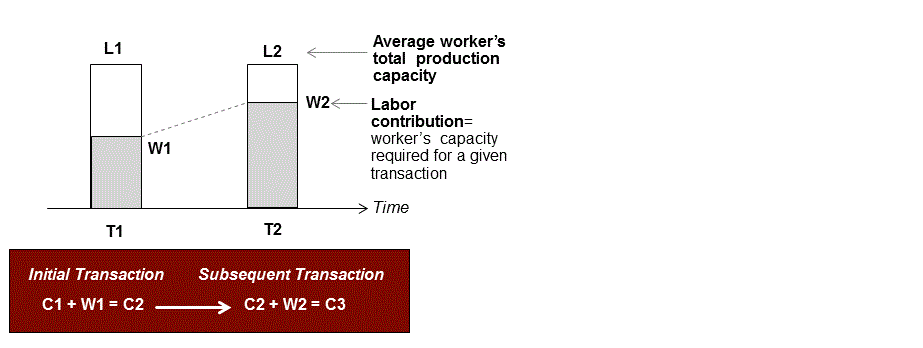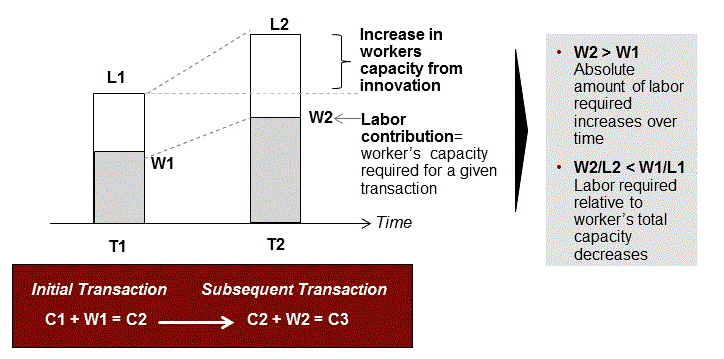The prolonged US recession and recent increase in income inequality has energized viewpoints challenging capitalism as a sustainable economic model. Some media and pundits have rallied around the Marx ideology that we are beginning to see capitalism starting to unravel itself.
In his “Das Kapital”, Marx argues that the capitalist’s pursuit of profit accumulation over time will increasingly lower wealth for the rest of the populace (workers or employees). Consequently, this appropriation of wealth of the masses by a few is unsustainable and leads to income inequality driven class warfare. Regarding the future of capitalism and wealth – Was Marx Right?
Marx’s Argument
Marx’s elegantly frames his argument as follows – in a much abridged form below.
The ultimate objective of commercial transactions in a capitalism economy is for a capitalist (investor) to seek profit. What Marx calls a C–>W–>C’ transaction. C is the initial capital invested by the capitalists. W is the totality of labor/productivity contributed by the workers. And C’ is the net capital, or profit, reaped by the capitalists from the transaction). By necessity C’ > C in a capitalism economy.
Marx argues that since capitalists seek ever increasing capital accumulation, subsequent transactions over time must appropriate greater amount of labor from the workers . See figure below. In the initial transaction, the capitalist invests C1 and demands W1 in workers’ production capacity, yielding C2 in net capital. Then, in future transactions, the capitalist invests C2 and demands W2 in workers’ production capacity to drive C3 in net capital. As such, in order for capital accumulation (i.e. C3>C2), the workers must increasingly contribute more labor (i.e. W2 > W1; proof by contradiction that C3 <= C2 for the curious).

The key to Marx’s argument in the above Figure is that W2 > W1 in a capitalism economy. Consequently, participating workers must progressively contribute more of their labor capacity for a given wage from the transaction. This effectively leads to wealth decrease for the workers (i.e. when the demand on worker’s labor contribution W meets their production capacity L).
Marx’s argument – an overlooked consideration?
I feel that Marx’s argument fails or inadequately considers a key assumption – innovation. Competition driven innovation and productivity increase, as depicted in below Figure.

Over time, capitalist transactions drive improvement in worker’s productivity through technology and management innovation. This is necessitated by ruthless competition between capitalist entities for profit. While successive transactions demand more from workers (i.e. W2 > W1), the worker’s production capacity has also increased (i.e. L2 > L1) . The worker may not be worse off after all; over time, she can complete a given transaction and earn the corresponding wage while using up a smaller portion of her total production capacity (i.e. W2/L2 < W1/L1). If the capitalist attempts to extract a greater portion of the worker’s capacity without additional pay (i.e. further alienation of surplus value in Marx parlance), the worker can take her talent to a competing option in the market. (One implication not explored in this article is the worker’s need for increased knowledge and education to unlock maximum production capacity).
In short , Capitalism doesn’t sow its own destruction. Rather, the capitalist pursuit of profit accumulation in a competitive market results in enhanced productivity. The resulting productivity increase allows a worker to contribute more labor without increasing her “burden”.
Capitalism and Wealth – Was Marx Right? The key question shouldn’t be what economic model can replace capitalism, but how can we better enable competition and innovation in a capitalism framework to accelerate productivity.
_____________
Selected sources: A Companion to Marx’s Capital; A Grand Pursuit – Story of Economic Genius

we just simply need an economic system that is more stable, and equitable. We had one in the 20th century for awhile.
LikeLike
I agree with the idea. How does Marx propose growth/improvement?
Also agree with hazencage – big concern is whether income inequality resulting from the capitalists efforts becomes so extreme that the potential for the average or below average to move up becomes extremely small (Good article on this topic http://www.economist.com/node/15908469 )
LikeLike
Marx deals extensively with the use of improved technology to increase worker productivity in Chapter 15 of volume 1 of Capital. He pretty convincingly argues that this doesn’t mean that the worker gets to work less; rather as the new technology gets adopted the value of labor simply goes down and the worker is expected to accomplish more for the same pay. He casts this in terms of manual craftsmen becoming assembly line workers making less money even while they produce more, but it is still true with modern computer technology. Programmers are vastly more productive today with modern interactive tools than they were in the times of punch cards, or but that doesn’t mean that they are paid vastly more; if anything it is becoming a commodity skill as it becomes less obscure.
LikeLike
thanks jbadger for your comments. I think its important to separate out (i) “benefits of capitalism enabled productivity” to workers vs. (ii) “need for being competitive” on the part of the worker as a response to increased innovation and productivity.
(i) macro-statistics over 80-100 year time range have shown beyond doubt that as capitalism driven economies ride the productivity curve, the average workers’ burden (proxied by age of entering work-force, on-job injuries/deaths, average work hours/day, etc.) vs. their wage (proxied by purchasing power, standard of living) have increased. In a Marx hypothesized “capitalist squeezing value from worker” setting, this observation would not have been nearly as pronounced.
(ii) as innovation/productivity rise and average wage rate increase, a direct consequence is of course increased competition, not only for “capitalists” but also “workers”. Why would firms pay for a skilled punch-card programmer when a Java/Ruby programmer can achieve same output for 1/50th of the time? Increased competition doesn’t necessarily lead to increased worker toil since they are building off of a more productive platform (e.g. searching information on Google vs. searching for information in the 1970s).
LikeLike
One additional implication of competing capitalist entities and the opportunity for workers to move between entities considers the profit maximizing long-term level of productivity demanded by capitalists. In the long-run, it will be optimal for some capitalist entities to minimize turnover due to employment transaction costs (hiring, training, knowledge transfer, supplier/customer relationships). Demanding short-term productivity improvements from workers that cause employees to leave will compromise profit maximization in the long-run for the capitalist.
LikeLike